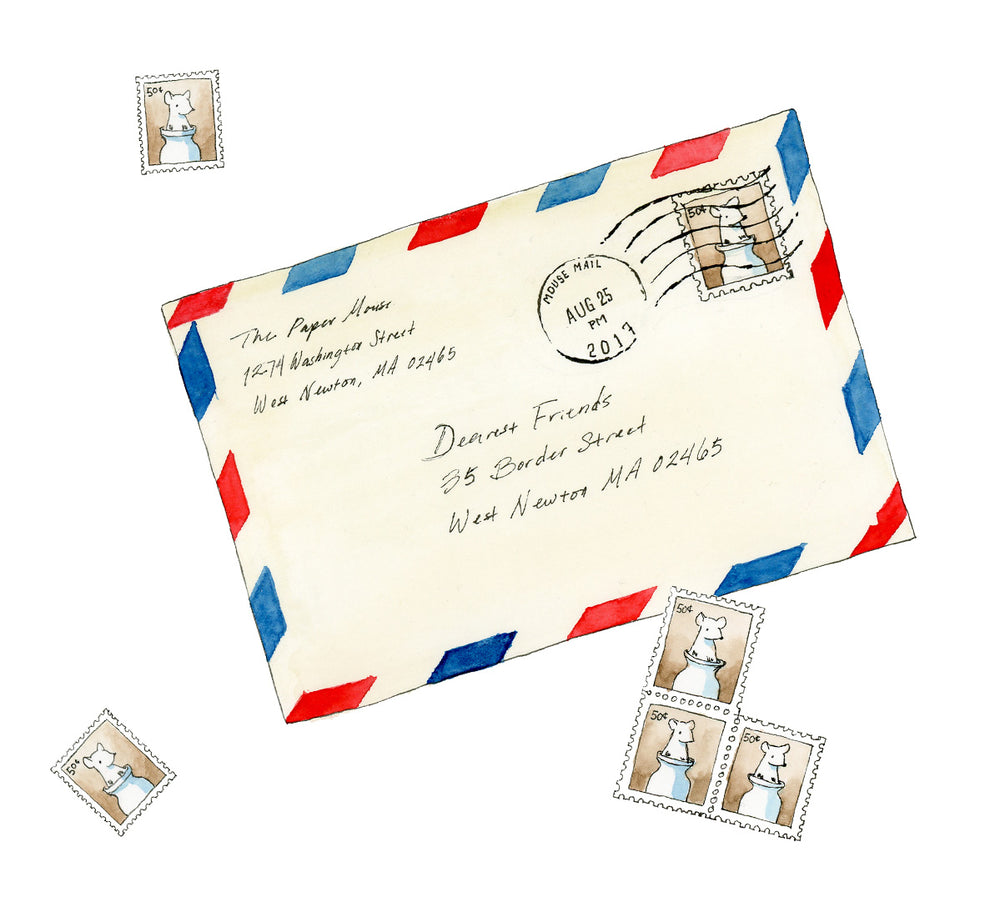Making Magic: The Ink Apothecary
"The Ink Apothecary" is part of Making Magic, a limited series of original short stories from The Paper Mouse team. We hope these stories will amuse and transport you.

A little bell tinkles somewhere as you push the door open.
It’s good to be inside, away from the mizzling mist that’s dampening every stitch of your clothing. When the door has closed behind you with a soft snick, the gray day fades away.
Before you is a snug and tidy shop. An oak workbench, its top pitted with knife marks, dominates the room. Bright lamplight winks off the glass bottles that line the walls, off the brass instruments neatly arranged on the workbench, off the windows keeping the mist at bay. Bundles of desiccated plants hang from hooks on the ceiling. Little pots of pigment rest under protective glass domes, though there’s no hint of dust in the room to contaminate the bright colors. In the middle of the workbench hulks an enormous stone mortar and pestle, well worn from hard use.
Cautiously, you advance a step further into the silent and orderly room.
“Good evening,” says a paper-dry voice from behind you. You jump, startling. Where has this wizened woman materialized from? She stands only about four feet tall and looks as brittle as a biscuit, but all the energy in the room seems suddenly concentrated in her. Her long, straight hair is so blazingly white it looks like the very absence of color—except at the ends, where it seems to contain all the colors in the world, fanned out around her tiny person and dancing like a candle flame.

“Good evening,” you return, hesitantly. “I suppose you are the apothecary?”
“I suppose I am.” “Ah. I have heard you can help… help me…” you say, trailing off uncomfortably. The little apothecary is watching you steadily, dark eyes glinting with some private judgment, though her face is inscrutable. Feeling your face grow hot, you try again. “I have heard,” you say, “that you create inks with, uhm, special properties. That when you write with them, they’ll make someone feel better, or believe what you’ve written, or—”
She waits.
“...Or,” you mumble, “make them fall in love with you.”
The apothecary cackles. “Love, is it?”
You feel yourself grow hotter.
“Go on, then,” she says. “Tell me what you’re after. Is it someone who won’t give you a second look? Someone who doesn’t like you much? I can’t make anyone love you against their will, you know. And I wouldn’t try.” Her eyes bore into you, making you squirm.
“It’s not that,” you protest. “I’d never—who would want that?”
“Plenty of folks want that. They fall in love with a charming face and they don’t care a bit about the brain inside.”
“It’s not that,” you repeat. “It’s my friend. We study together—we do everything together. I took her out for dinner to tell her I like her, but then I choked on my broccoli. I can’t say it.”
“So what do you want from me, then?”
“I just thought—if I could write it down in your ink, maybe she’d want to give it a chance. If she says no right away, then I’ve gone and ruined everything. But if we could just give it a try, I’m sure we’d be happy.”
“Love’s not so simple, my dear,” she says, stepping toward the workbench and, mercifully, freeing you from her stare. “It’s not a matter of making someone happy just once. Love’s an everyday thing, not a story where you fall in love one day and live in fairyland forever. If she says yes today, she could still say no tomorrow. No ink will change that.”
You feel your hopes withering before this hard little judge. She can’t help you, after all. “So there’s no use bothering, then,” you say, not without a bit of desperation.
“I never said it was useless. I can create an opportunity for you, that’s all. I can give you an ink that will compel your friend to listen, really listen to what you’re saying, and really consider it. I can make a few stars align, so to speak. But the rest must come from you. If you write something rubbish, that’s not my fault.”
You consider. It doesn’t sound like much to go on. But then, what else do you have?
“How much?”
The apothecary snorts. “I haven’t got a discount for besotted youths who can’t afford a proper meal. Eight crowns.”
Your stomach drops. That much money could buy three square meals at the student canteen, and the apothecary is quite right that you haven’t had one all day. But isn’t it worth it? Wouldn’t you rather have a chance to hold her hand than the finest cut of meat money can buy?
“I’ll take it.”
With a curt nod, the little woman goes to work. She pulls down half a dozen jars from the shelves behind her workbench. You peer over the bench, trying to recognize the ingredients, but they’re unfamiliar to you. One of the jars is filled with what looks like grubby little insects; another with some sort of nut, perhaps; another with the petals of an unfamiliar flower. The apothecary measures out small scoops of each, apparently without need of notes or reference books, heaping them all together inside her massive stone mortar. Then she picks up the pestle and begins pounding the ingredients together with a strength that surprises you for so brittle-looking a woman.

Soon she has produced a fine crimson powder. You can’t understand how such dull materials have transformed into such a bright color. The apothecary rolls the stone bowl onto its side and tips the powder onto a square of paper. Then she curls the paper to funnel the powder into a metal bowl the size of your fist. To this she adds still more ingredients: pinches from two of the pigment pots on the workbench, a pump of something from a perfume bottle that smells refreshing and elusive, and a drizzle of clear liquid that looks like water but clearly isn’t, for when it splashes into the bowl the whole mess turns suddenly and shockingly blue, blue like a summer sky.
“What—?” you hear yourself say. The apothecary ignores you.
With a grooved wooden stick, she begins vigorously stirring the bowl’s contents until they coalesce into a sort of sludge. Already you can see that the color is changing again, darkening around the edges. The apothecary reaches for a porcelain jug with an elegantly curved spout. Into the bowl she pours another stream of something clear—you’re almost certain it’s water this time—and stirs again. The substance is beginning to look like ink now, or at least it has the consistency of ink, though its color and slightly shimmering surface remind you of no ink you’ve ever seen.
Still ignoring you, though you can’t help leaning in close with fascination, the apothecary pulls out a tiny vial of—something. It’s definitely glowing, limning the apothecary’s pigment-stained hand with a warm pinkish light. It’s eddying around inside the vial in pearlescent puffs like a cartoon cloud. You find you can’t quite look at it head-on.
You had thought the substance was gaseous, but it must be liquid, for the apothecary taps out a few drops into the bowl before corking it up again and secreting it away. Then, placing her hands on either side of the small metal bowl, she swirls it three times, clockwise, and thrice more in the other direction. There’s a faint crackling sound in your ears, like someone’s crinkling a piece of waxed paper.
The apothecary pulls out a round glass bottle and a narrow funnel. Slowly and with great care, she pours the ink into the bottle. The metal bowl had seemed full of the wonderful liquid, but to your surprise, the small bottle holds every last drop.
She holds the bottle up to the light with a sidelong glance in your direction, and you feel your breath catch. What is that color? It’s impossible to pin down: first dark and impenetrable, then shifting and shimmering to reveal little bursts of light. When you look at it one way it seems reddish, but you look again and it’s something else: green, or purple, or yellow.
The apothecary puts down the ink bottle and begins sifting through the strands of her hair, sorting the ends until she finds a section that has not yet been stained with color. She pinches the white hairs with her fingertips and dips them like a paintbrush into the bottle, where they are saturated with the wondrous color. From her pocket, she withdraws a well-thumbed little booklet of brown leather, which falls open to a blank page. She draws her hair across the top of the page in a shimmering, dancing line. It comes out in a bright, pulsing slash of vermilion like the velvet petals of a rose or the blood pounding in your veins. But even as you look, it changes to something deeper, richer. Dark shades appear, then sparkles of light. It fades to a pale mauve color, brightens to a spring green, and shifts again, finally settling on something that looks a little like molten gold.
Mesmerized, you stare at the line of ink until the apothecary shoves the book toward you and drops a pen on top. “Sign,” she commands, and you dip the pen into the ink bottle with shaking fingers and sign your name.
Curious, you start to turn the page over, aching to see what other marvels the little book contains—but the apothecary’s ink-stained hand reenters your line of vision, closing the cover firmly. “Ah-ah,” she says. “No peeking. Don’t you want your ink?”
Yes—your fingers have been itching to close over that little bottle from the moment you saw it. You dig in your pockets for your coin purse, and scrabble around until you find her payment.
“Well, my dear,” she says, and holds out the little glass bottle, all stoppered up. “I hope you find the right words.”

Stammering out your thanks, you take the marvelous ink. It was worth the cost just to watch it being made. You hurry home in a fever, unconscious of the miserable mist or your loudly complaining stomach. Your desk is littered with papers: feeble, halting attempts at the letter you’ve been aching to send and attempting to compose day after day after day. You sweep them all together and shuffle them off to a corner before seizing a fresh sheet of paper. Above it, you place the bottle of ink. It seems to shine a golden light on the page.
You uncork the bottle and begin.
--------------------
Read the other installments of the Making Magic series here:
The Library



What happens next?? Reading this story has left me with a wonderful glow – thank you.
Ahhh. Loved reading / watching the creation of this ink. Thank you.
The images conjured up are so vivid in this story!
This is mesmerizin ! What a fantastic tale. Can hardly wait for the next one.
Leave a comment